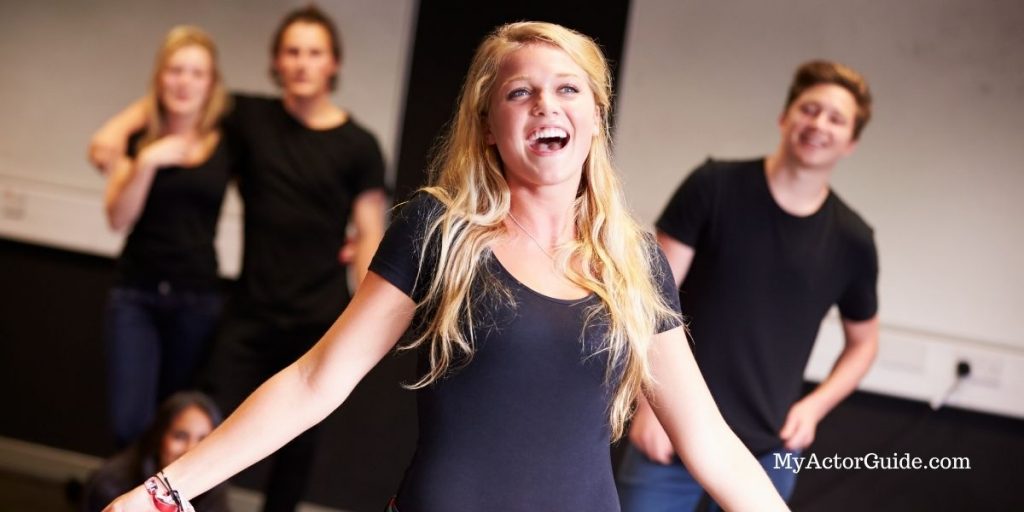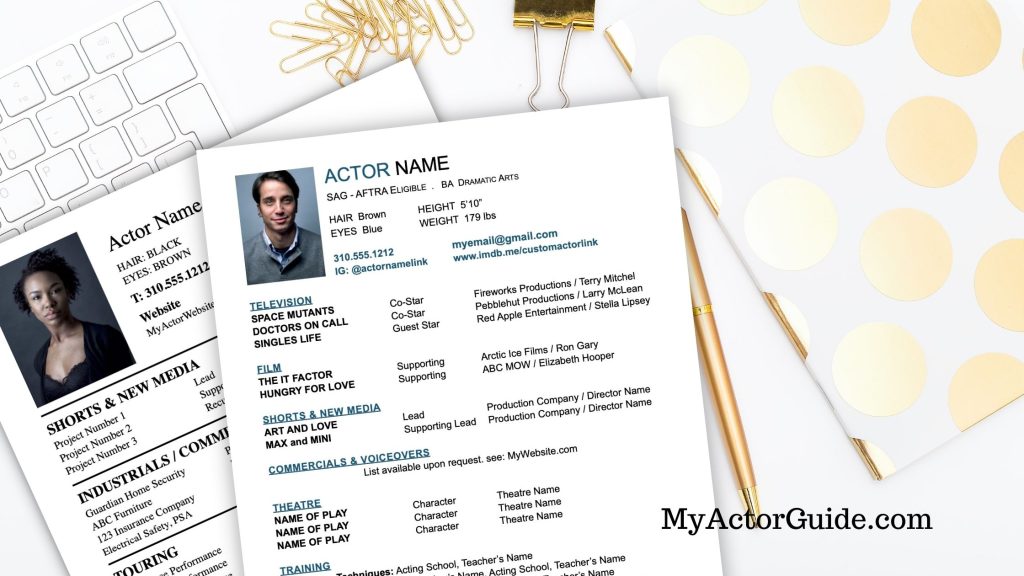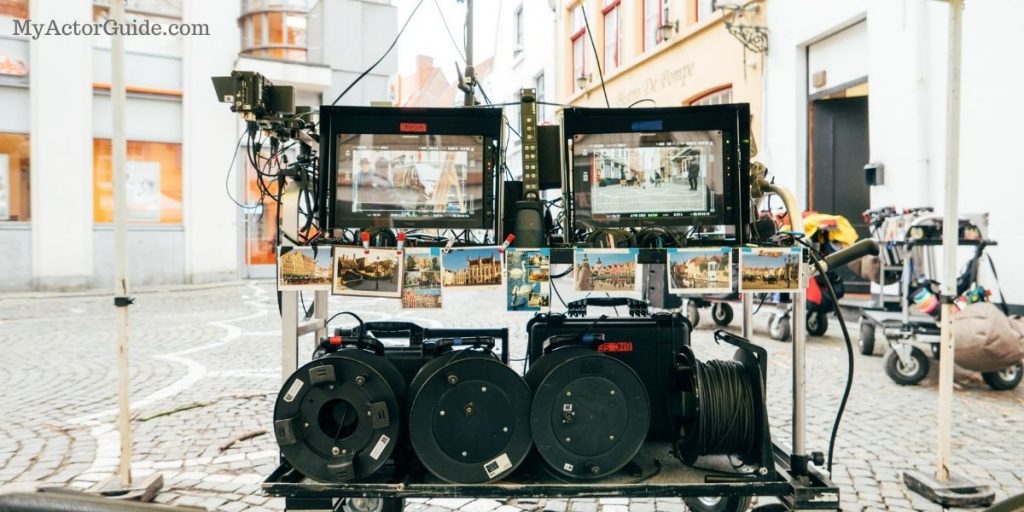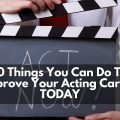This post may contain affiliate links, so I may receive a commission, at no cost to you, if you make a purchase through a link. Check out the disclosure for more info. And thank you for supporting free content!
Whenever you try something new, you’re going to make mistakes. This is true in any career, profession or creative endeavor – acting is all 3.
New actors are always interested in “What should I be doing to book more jobs, get an agent, get on TV and have a career as an actor?” But no one ever seems to ask “What mistakes should I be avoiding?”
Yet this is what casting directors, agents, managers and directors (the people who hire you or are instrumental in the process of you getting hired) talk about the most. All of these professionals hope you’re going to be good, maybe even great, and expect you to be at least competent. But wow! Nothing get’s under someone’s skin like missteps and mistakes.
I asked a number of my favorite industry pros to share their pet peeves (not naming names here!) and they unanimously complained about the frustration of seeing so many actors make the very same career mistakes again and again. These mistakes derail careers, delay progress and can turn into major stumbling blocks.
In other words, “What can ruin an acting career?” Here are the Top 8 Career Mistakes That Actors Commonly Make
8 Common Career Mistakes to Avoid for Actors
Mistake #1: Not Taking Acting Classes … Across the Board and Consistently.
Natalie Portman, Rashida Jones, Matt Damon, Ben Affleck, and Mira Sorvino all graduated Harvard Drama School. And Lupita Nyong’o, Meryl Streep, Paul Giamatti, Angela Basset, Paul Newman and Frances McDormand all graduated from Yale Drama School. It’s no coincidence that so many Hollywood A-Listers come from Ivy League schools. While I understand that we don’t all have those opportunities, start from where you are, and learn the basics…. then keep going.
Acting as a craft covers so many areas including Scene Study, On-Camera Techniques, Script Breakdown, Creating a Character, Emotional Exploration, Improv, Commercial Skills Audition Technique, Shakespeare, Sitcom Training and of course Vocal Lessons for Spoken Voice.
If you haven’t studied at least 2-3 of those areas, chances are someone you’re auditioning against has.
Casting directors look at your resume and training to see what you’ve done, what your strengths are and where there might be gaps. The techniques with give you a solid foundation in the craft and classes can also be an excellent way to network and build industry connections.
Also read:
- How Studying Shakespeare Instantly Makes You a Better Actor
- Getting Into Character: 50 Killer Question to Help You Prepare as an Actor
- How To Find The Best Acting Class for You
Mistake #2: Not Covering the Basics
The basics are having professional headshots, a well thought out, industry standard resume, up to date casting profiles, an actor’s website, professional social media accounts, an IMDB page with credits, a subscription to IMDB-Pro, and, hopefully a good reel.
These things are all the basic tools you need to get going and to promote yourself and your services. They also show that you are as serious about being in the business as the people you want to hire you are.
Also read:
- ACTOR RESUME: FREE Template Download and What To Include, What To Avoid
- What is an Actor’s Headshot and Why Do You Need One?: Essential FAQ Answered
- Social Media for Actors: Why You Need It, and 5 Golden Rules to Ace Your Profiles and Book More Work
Mistake #3: Not being Clear on Your Type or “Your Brand”
I kind of hate the term “branding” for actors, (it makes me feel like people think we’re cattle) but it branding today is essential.
Are you the sexy vixen, or hot heart-throb? Maybe the goofy nerd or lovable looser? Or the cop, tough guy or mom or dad next door?
All actors have a type. Knowing it and embracing it can help you with what kinds of headshots to shoot, what kind of roles to submit for, the types of auditions you are most likely to nail and even the type of agent who is going to be best for you.
And it’s not up to casting to figure out what to do with you. Know you’re type, then go out and sell it!
Also read:
- How To Find Your Type As An Actor: 5 Easy Steps
- How To Plan and Shoot Headshots That Will Get You Cast
Mistake #4: Being Unprepared for Auditions or Blowing Off Auditions
Casting directors today in major markets, get between 2,000 – 5,000 submission per role – really! So if you’re lucky enough to score on of the coveted audition spots, generally between 30 and 200, treat it like the golden opportunity it is.
If you really can’t make it or seriously can’t record a self-tape, at least have the courtesy to let casting know ASAP. Some casting directors actually keep “do not cast lists” for the no-shows and flakes.
And if you are gong to show up… then put on a show! Don’t half-ass it. Everyone’s time is valuable and they have no interest in watching you stumble through a piece that you haven’t worked out, or even bothered to memorize your lines. Time and patience are in short supply. Believe me, if you do an amazing job, everyone will be riveted and love you! But if you’re just going through the motions, they won’t hesitate to call “Next!”
Also read:
Mistake #5: Being Unprepared or Unprofessional on Set.
Similar to the one above, once you book the job, you had better do your homework and show up ready to work! I once did a shoot with a young actress who hadn’t bothered to learn her lines and thought it would be cute and attention getting to play the “dumb blonde”.
She needed 45 takes to get through a very short monologue …. Not kidding! She was barely able to string together enough words for the director to cut together in a usable way, and it was a crucial role and speech that was too late to recast. This one person put us hours behind schedule, everyone was cranky and exhausted and the shoot now thousands of dollars over budget. If you can’t do the work, or take the pressure, don’t audition for, or agree to a role of that size, start smaller.
As well as actually being able to do what you were hired for, know film set etiquette; who’s who, what to touch, what to leave alone and how to behave. On-set mistakes can be both costly and dangerous and cost you jobs for years to come.
Also read:
- 53 Film Terms New Actors Need Know Before Stepping On Set
- How To Be an Extra in a Movie … No Auditions and No Experience!
Mistake #6: Being a Diva or Just Generally Having a Poor Attitude.
This is the number one complaint I hear from directors and other crew members, is inexperienced actors complaining, making demands or unreasonable request, showing up late, in a bad mood or arguing – about anything. This is not the time or the place. Movies and TV shows are definitely a group effort; it’s the only way for things to get done.
A bad attitude is contagious. It can effect not only the morale on set, but the quality of the production. And no one wants to work with anyone who’s “difficult”. Show up prepared, professional, pleasant and get the job done. It may seem simple, but people will love you for it.
A bad attitude or quarrel on set can burn bridges that will haunt you for years to come.
Also read:
- 9 Personality Traits That Will Help You be More Successful As An Actor
- 110 Quotes for Actors to Inspire You to Follow Your Dreams
Mistake #7: Trying To Fake It
Don’t lie on your resume. Don’t lie about your experience, who you know or your capabilities or your special skills. Eventually, it will come out and people will be pissed! Especially if you’ve already been hired because of something you said you could do.
We all have to start from somewhere, and none of us can do everything. Trust that you are perfect for where you are at right now, and you’ll align with the perfect projects, and you can learn the rest as you need as you move along. Everyone loves a beginner’s mind and someone who’s willing to learn. Be professional, know your current limits, but stay open to the experience and the moment.
Also see:
- Actor Credits Defined: What is Your Role?
- [VIDEO] Becoming an Actor With No Experience (Client Interview)
Mistake # 8: Lack of Confidence, Resilience and Positive Focus
There is something about this business that can wear down the self esteem and buoyancy of the most self-assured and optimistic person around. You have to pitch a lot, audition a lot, and take a lot of “no’s”. You may work for little money, no money and deal with crazy hours and big egos. This is par for the course, but try not to let it break down the core of who your are or the confidence you have in yourself and your belief and your faith in your dreams.
We all go through low spots, but stay away from the nay-sayers and get extremely good at taking care of you. If you are really going through a rough patch, step back for a bit, take a break and regroup. It’s better than trying to push forward depleted, depressed or run down. If other people can do this, you can to!
Also read:
- 57 Positive Affirmations for Actors for Creativity, Self-Esteem and Success
- How to Make Positive Affirmations Work for You as an Actor
Working in this business can be tough, but it’s also incredibly rewarding and fulfilling! Yes, achieving your dream career will take hard work, persistence, skill and perseverance, but knowing what pitfalls to avoid can save you years of struggle and just make the journey a whole lot smoother ind infinitely more fun.
As I said in the beginning, whenever you’re trying something new, you will make some mistakes – that’s inevitable; it’s part of the learning curve. But you can at least avoid the big ones and don’t let the small ones drag you down!
Was this tip on career mistakes all actors should avoid helpful to you? What’s your biggest struggle when it comes to having an acting career? Tell me about it in the comments below… I answer every one!
Like this post or love it? Tweet it. Post it. Pin it. Share it with actor friends! It’s a tough business and we could all use a little help!
* Please Note: I am not an agent, manager, or casting director. I do not procure work for actors. All information, workshops and coaching are for educational purposes only and are not a guarantee or promise of employment. Thank you for being here!













